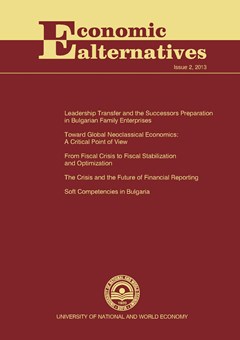Toward Global Neoclassical Economics: A Critical Point of View
Author: Atanas P. Atanasov
Abstract
Summary:
It is argued that in Lakatosian sense the Expected Utility Model - which is the core operating block of the Neoclassical Research Programme and its globalization faces serious challenges. It could be accused of relative degeneration. The following notes focus on the evolution of the model and on the failure to describe its generalization, though its axiomatic foundation is relaxed.
The following remarks aim to present a relatively critical view on the prospects of the globalization of the Neoclassical Research Programme, focusing on the Expected Utility Model (EUM). This model represents the methodology of the programme after World War Second (WW2). As a result its evolution in the decades after WW2 and especially in the last two decades have come to serve as a benchmark for the evaluation of the dynamics and prospects in the development of the dominating Neoclassical economics, including its globalization.
Globalization, or the establishment of the so-called Global economics, are terms that imply internationalization, global positioning and the application of leading contemporary economics, that is Anglo-Saxon economics, which is officially operating in the developed economies and throughout the world, no matter whether it is referred to as Mainstream economics or Neoclassical economics. The so-called Global economics has the distinguishing features of the neoclassical theoretical economics, namely axiomatization, formalism, and modeling.
As these features are typical of the construction of Expected Utility (EU), developed by John von Neumann and Oscar Morgenstern (1947 [1944])1, which has considerably influenced the development of the post WW2 economic theory – the evolution and the state of EUM since 1940s exposes the trends in the development of neoclassical economics and its globalization.
Three are the main starting points that are used, without going into detail, to present the relatively critical view of the theoretical and descriptive efficacy of the globalizing neoclassical economics. 1. The axiomatization of EUM in mid and late 1940s, the clarification of its axiomatic foundations and the interpretation of its meaning and importance in 1950s. This point is crucial for the organization and the explicit statement of this critical point of view because, in principle, the rationalizing of individual choice and decision making in last decades is treated in specialized literature in the context and in the light of this axiomatization. 2. The evolution of the general form of EUM. The paper presents this point in a brief and schematic manner, paying attention to the specific multiplicative form of the model, which undergoes many changes primarily along the line of the development of the two subjective transformation functions - the subjective transformation function of the outcome and the subjective transformation function of the probability for the occurrence of the outcome. Such a schematic presentation offered below does not go into detail with regard to the complexity of the presentation of the individual choice using EU (this requires more concrete and in depth analysis), but provides for outlining the overall evolution, while presenting in a specific form the evolution of EUM, focusing on its general trends of development. 3. The evaluation of the role of axiomatization to support or reject a model or a theory. This is done from the perspective of the weakening EUM axioms, in order to accommodate the so called anomalies (descriptive contradictions, descriptive failures) which EUM encounters, and specifically from the point of view of the descriptive failure of the weakened generalizations of EUM. As is well known, such failures are registered. And this is the decisive argument. The observed descriptive failures of the weakened EUM are interpreted in Lakatosian sense as a relative degeneration of the methodology of this programme. This paper formulates the arguments and structures the defense of the view in two parts.

